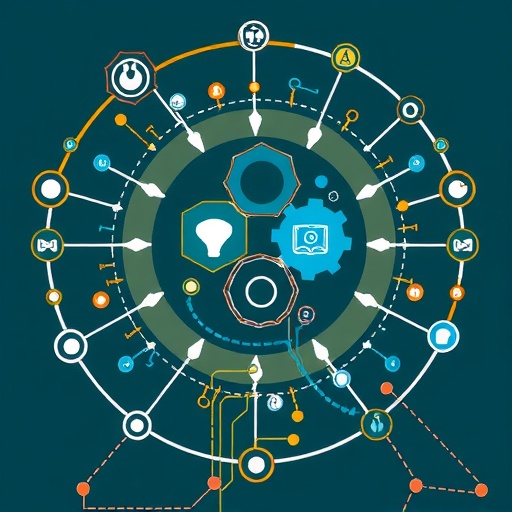In recent years, the academic landscape has witnessed a profound shift in the methodologies employed for both teaching and research, particularly within the realm of postgraduate education. A significant development in this transformation is the growing acceptance and utilization of artificial intelligence (AI) in self-directed research learning. A recent study published in Discov Educ offers a compelling insight into how Nigerian public universities are embracing AI to enhance the educational experience of postgraduate students. This research underscores a pivotal moment in educational technology, as it evaluates not only the acceptance of AI but also its implications for the future of autonomous learning.
Artificial intelligence, which was previously regarded as a futuristic concept, is now becoming an integral part of academic frameworks. As postgraduate students navigate through complex research topics, they increasingly rely on AI tools to streamline their work processes. The study by Owan et al. explores various AI applications tailored for self-directed research, encompassing tasks ranging from literature review automation to data analysis and personal research management. The findings indicate that students are growing more comfortable with these technologies, a trend that could drastically alter the research landscape.
One of the most notable observations from the research is the correlation between students’ familiarity with AI and their academic performance. The authors argue that students who integrated AI tools in their research activities not only managed their time more effectively but also produced higher-quality outputs. This suggests that the academic community must consider how to incorporate AI training into curricula, thus equipping students with the necessary skills to leverage these powerful tools for their educational benefit.
The components of AI technology contributing to this shift range from machine learning algorithms to natural language processing capabilities, each playing a critical role in assisting students with diverse research tasks. The ability of AI to analyze vast datasets and provide contextual insights fosters a deeper understanding of complex subjects. This capability is especially valuable for postgraduate students, who often engage in research that demands a high level of critical thinking and analytical skills. AI can serve as a robust companion in navigating these intellectual challenges.
Moreover, the implications of AI usage in research extend beyond individual performance. As postgraduate students become more adept at leveraging AI tools, they also contribute to the overall research output of their institutions. Increased efficiency and enhanced quality of research can lead to a more competitive academic environment, resulting in higher publications and increased recognition of Nigerian public universities on the global stage. The ripple effects of this technological integration hint at a more collaborative and innovative research culture.
However, the embrace of AI is not without its challenges. The study reveals that there are still significant barriers to widespread adoption, fueled by misconceptions, lack of resources, and inadequate training. Many students express concern about the reliability of AI-generated results and the ethical implications of using such technologies. This skepticism can hinder the potential benefits of AI, highlighting the need for educational institutions to provide clear guidelines and support systems as students navigate this new landscape.
The authors also point out the vital role that educators play in facilitating the acceptance of AI tools among postgraduate students. By fostering an environment that encourages experimentation and critical engagement with AI technologies, universities can promote a culture of innovation. Workshops, seminars, and hands-on training sessions can empower students to understand the capabilities and limitations of AI, transforming apprehension into enthusiasm.
Moreover, collaboration among academia, industry, and governmental bodies can foster an ecosystem where AI technologies are continuously refined and tailored to meet the unique needs of researchers. Policymakers and educational leaders must work together to establish frameworks that support the effective integration of AI into research practices, ensuring that students have access to the tools and resources required for successful self-directed learning.
The future of research learning, particularly in contexts like Nigerian public universities, could significantly depend on how effectively institutions embrace AI. The evidence presented in Owan et al.’s study positions AI not merely as a supplementary tool but as a potential game-changer that could redefine the boundaries of autonomous research. As technological advancements continue to evolve, it will be crucial for educators and researchers to stay ahead of the curve, adapting teaching methods and curricula to fully harness the power of AI.
In summary, the acceptance of artificial intelligence for self-directed research learning among postgraduate students signifies a remarkable evolution in academic practice. The insights from this study serve as a crucial reminder of the potential that lies in merging traditional educational methodologies with cutting-edge technology. By acknowledging the strengths and limitations of AI, educational institutions can pave the way for a new era of research that prioritizes innovation, collaboration, and enhanced learning experiences. As AI continues to permeate various facets of life, its role in academia will only become more pronounced, heralding a transformative era for educational research.
In conclusion, the integration of artificial intelligence in self-directed research learning among postgraduate students in Nigerian public universities is not just a trend; it is a significant leap toward modernizing education in a rapidly evolving world. By fostering positive attitudes towards AI and addressing the challenges associated with its use, universities can empower their students to thrive in an increasingly digital research landscape. The findings of Owan et al. serve as a clarion call for academics and institutions alike to embrace this change, thus ensuring that they remain relevant and competitive in the global academic arena.
Subject of Research: Acceptance and use of artificial intelligence for self-directed research learning among postgraduate students in Nigerian public universities.
Article Title: Acceptance and use of artificial intelligence for self-directed research learning among postgraduate students in Nigerian public universities.
Article References:
Owan, V.J., Chukwu, C.O., Agama, V.U. et al. Acceptance and use of artificial intelligence for self-directed research learning among postgraduate students in Nigerian public universities.
Discov Educ 4, 329 (2025). https://doi.org/10.1007/s44217-025-00770-6
Image Credits: AI Generated
DOI: 10.1007/s44217-025-00770-6
Keywords: Artificial Intelligence, Self-Directed Learning, Postgraduate Education, Research Methodology, Nigerian Universities.




